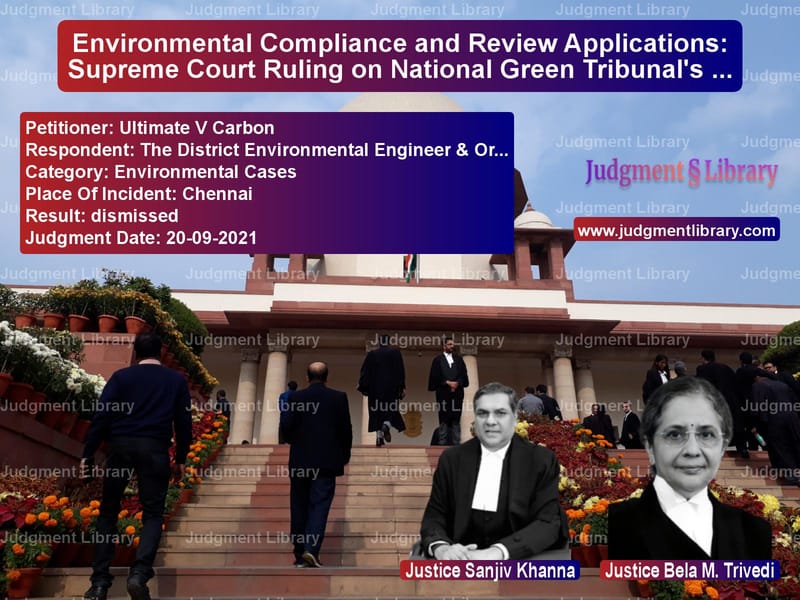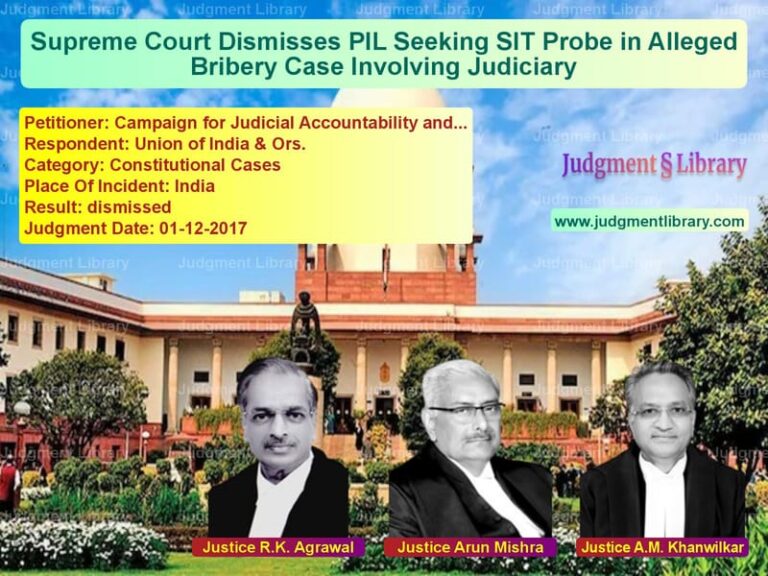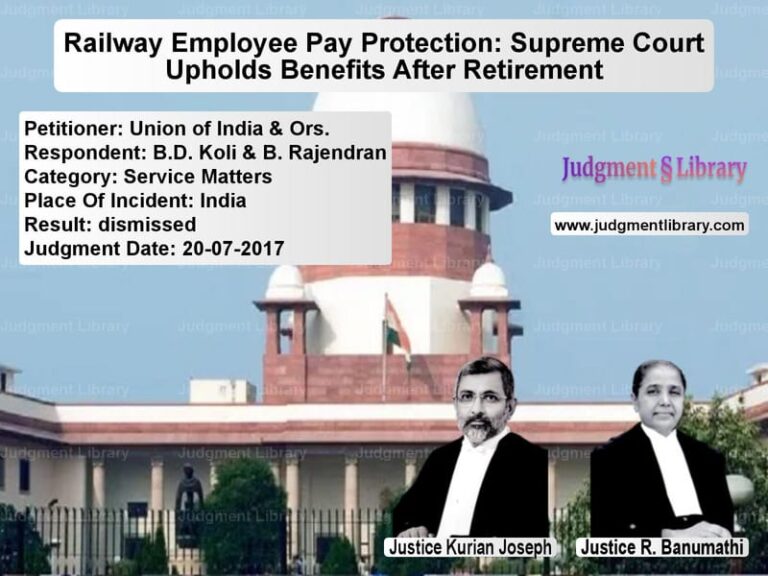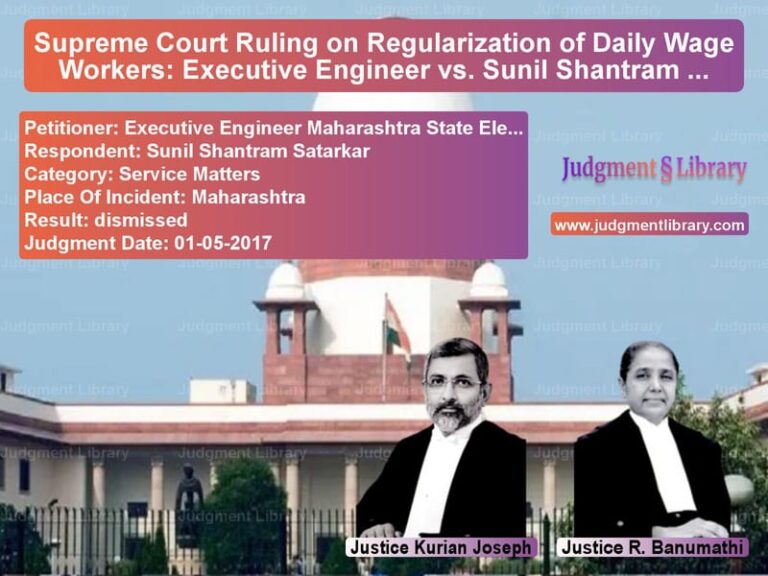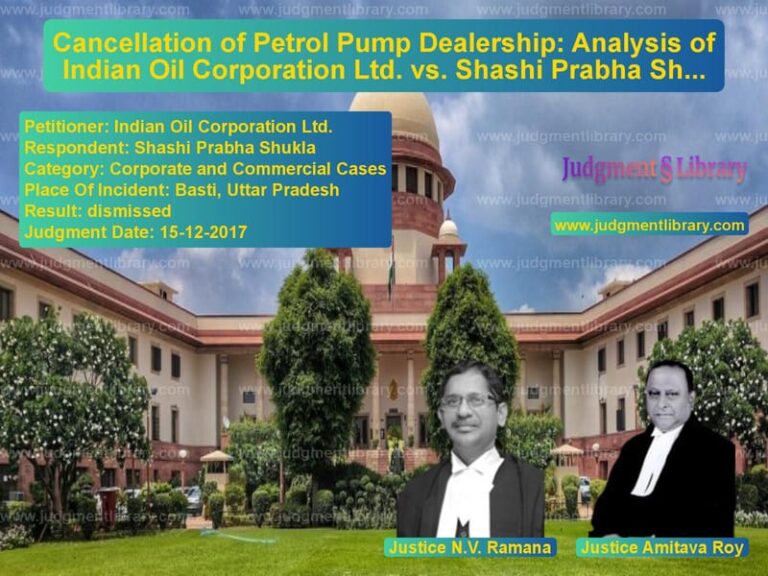Environmental Compliance and Review Applications: Supreme Court Ruling on National Green Tribunal’s Order
The case of Ultimate V Carbon vs. The District Environmental Engineer & Ors. addresses the legal implications of non-compliance with statutory environmental regulations. The appellant, Ultimate V Carbon, challenged the order issued by the National Green Tribunal (NGT), Southern Zone, Chennai, arguing that they were not given the opportunity to be heard before the decision was made. The case explores issues of procedural fairness and the rights of businesses in the context of environmental law enforcement in India.
Background of the Case
Ultimate V Carbon, an industrial company, faced a ruling from the National Green Tribunal (NGT) which held them accountable for non-compliance with environmental regulations. The NGT’s decision was based on arguments presented by an association of charcoal manufacturers, who had intervened and were heard before the order was passed. The appellant contended that they were not notified of the proceedings and were therefore denied a chance to present their side of the case.
The NGT order, which imposed penalties and corrective measures on Ultimate V Carbon, was appealed by the company, arguing that they had adhered to all statutory environmental norms. The matter was escalated to the Supreme Court, where it was argued that the company should have been allowed to participate in the proceedings before the NGT passed its final order.
Legal Issues Raised
- Whether the appellant’s right to a fair hearing was violated by the NGT’s decision to pass an order without notifying them.
- Whether the appellant, who claims to be compliant with statutory norms, should be penalized based on arguments made by an intervenor (charcoal manufacturers’ association).
- Whether the appellant can file a review application before the NGT or if the limitation period bars such action.
Petitioner’s Arguments (Ultimate V Carbon)
The petitioner, represented by Senior Counsel Mr. Kapil Sibal, argued:
- The NGT’s decision was made without affording the appellant an opportunity to be heard, violating principles of natural justice.
- The appellant had always been compliant with statutory environmental norms and should not be penalized based on allegations from an intervening party.
- The appellant should be given the right to challenge the NGT’s decision through a review application, which was unjustly barred due to the limitation period.
- Even if the review application is barred, the appellant should be allowed to file for condonation of delay, given the circumstances of the appeal.
Respondent’s Arguments (The District Environmental Engineer & Ors.)
The respondents countered with the following arguments:
- The appellant had failed to adhere to environmental norms and should be held accountable for any non-compliance.
- There was no requirement for the appellant to be heard directly, as the NGT had already considered submissions from the intervening parties, who represented affected stakeholders.
- The review application was indeed barred by limitation, and the appellant’s plea for condonation of delay was not substantiated by sufficient grounds.
- The NGT’s decision was made in the interest of the environment, and the appellant’s challenge to it was unfounded.
Supreme Court’s Judgment
The Supreme Court granted permission for the civil appeal but directed that the appellant’s case for review be taken up before the NGT. The Court emphasized that the appellant’s right to be heard had been violated and allowed the company to approach the NGT with a review application.
“It would be open to the appellants to file a review application before the National Green Tribunal, Southern Zone, Chennai, to press their stance and case. The review application, if filed, would be considered on grounds as permissible in law.”
“If the review application is barred by limitation, it will be open to the appellant to move an application for condonation of delay, which would be considered giving due regard to the fact that the appellant has filed the present appeal.”
Key Observations:
- The Court recognized the appellant’s right to be heard and the importance of procedural fairness in legal matters.
- The appellant’s argument for review application was valid, and the limitation period was not an insurmountable barrier if the delay was justified.
- The Court refrained from passing a final judgment on the merits of the NGT’s decision, allowing the appellant to challenge it through appropriate channels.
Impact of the Judgment
- This ruling emphasizes the importance of fair hearing and due process in regulatory and administrative proceedings, especially when it comes to environmental compliance.
- The judgment establishes that parties have a right to challenge orders that directly affect them, especially when they have not been given an opportunity to present their case.
- It provides clarity on the procedure for filing review applications before regulatory bodies like the NGT, even if the statutory limitation period has expired, under appropriate circumstances.
Conclusion
The Supreme Court’s ruling in Ultimate V Carbon vs. The District Environmental Engineer & Ors. underscores the significance of fair administrative processes in environmental law. By allowing the appellant to file a review application, the Court ensured that justice was served in a case where the appellant was not given a fair chance to defend itself. This judgment reinforces the importance of adhering to procedural fairness, especially when decisions affect the livelihoods of businesses and their compliance with environmental norms.
Petitioner Name: Ultimate V Carbon.Respondent Name: The District Environmental Engineer & Ors..Judgment By: Justice Sanjiv Khanna, Justice Bela M. Trivedi.Place Of Incident: Chennai.Judgment Date: 20-09-2021.
Don’t miss out on the full details! Download the complete judgment in PDF format below and gain valuable insights instantly!
Download Judgment: ultimate-v-carbon-vs-the-district-environ-supreme-court-of-india-judgment-dated-20-09-2021.pdf
Directly Download Judgment: Directly download this Judgment
See all petitions in Environmental Cases
See all petitions in Public Interest Litigation
See all petitions in Contempt Of Court cases
See all petitions in Legal Malpractice
See all petitions in Judgment by Sanjiv Khanna
See all petitions in Judgment by Bela M. Trivedi
See all petitions in dismissed
See all petitions in supreme court of India judgments September 2021
See all petitions in 2021 judgments
See all posts in Environmental Cases Category
See all allowed petitions in Environmental Cases Category
See all Dismissed petitions in Environmental Cases Category
See all partially allowed petitions in Environmental Cases Category

